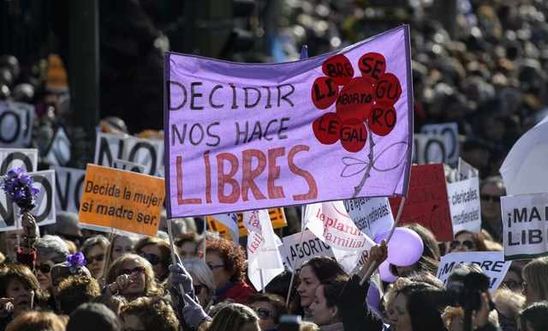
Press releases
Dropped anti-abortion bill must usher in better protection of women’s rights in Spain

Yesterday’s abandoning of a draconian anti-abortion bill that threatened the health, dignity and lives of women and girls in Spain is a step in a positive direction, Amnesty International said today.
The proposed bill presented a series of obstacles to accessing a safe and legal abortion. For example, a woman or girl seeking an abortion would have to obtain two certificates from doctors at different centres, confirming any risks to the life and health of the woman and the foetus. She would also be obliged to receive counselling and information on non-medical issues, and then to wait seven days during a “reflection” period.
Meanwhile. a woman or girl who became pregnant as a result of rape would have been forced to report the crime to the police in order to access abortion services. This would be particularly problematic for victims of incest, and migrant women and girls with irregular status who would in some cases risk being expelled from the country if they went to the authorities to report the rape.
The introduction of the bill provoked uproar from international and Spanish civil society groups, health professionals and women and girls in Spain who were vociferous in their opposition to the bill. Amnesty delivered to the government a letter demanding withdrawal of the draft bill signed by 176 human rights, health and women’s rights organisations and a petition signed by over 130,000 people.
While the dropping of the bill is an important step, threats to the health and autonomy of women and girls in Spain remain. The government is still proposing that parental consent would be required for adolescent girls aged 16 to 18 seeking to access abortion services. This would be a retrogressive step which departs from recent recommendations from the United Nations’ Committee for Economic, Social and Cultural Rights advising Spain to further remove barriers to abortion services, with particular attention to adolescents and migrants.
Amnesty International Spain Director Esteban Beltrán said:
“We’re glad that the Spanish Prime Minister has finally scuppered this retrogressive anti-abortion bill, but the fact remains it should never have been on the legislature’s books in the first place.“The end of this bill shouldn’t mean looking for new ways to add barriers to women and girls accessing safe abortions, it must mean looking for ways to dismantle them.“The government must not control decisions women and girls make about their lives and health, and fully implement the recommendations by international human rights bodies.”
Legal changes in Spain
In 2010 Spain adopted Law 2/2010 that relaxed restrictions on abortion services. The law was a welcome legislative development at a time when Spain had some of the most restrictive legislation on abortion in Europe. In 2012, the United Nations Committee on Economic, Social and Cultural Rights urged the government to ensure the full implementation of Law 2/2010. Instead of complying with this recommendation, the government proposed a bill that would have restricted access further, and introduced humiliating obstacles putting at risk the health and lives of women and girls.
Amnesty gathered more than 133,400 signatures from around the world opposing this bill, part of a series of activities forming part of ‘My Body My Rights’, Amnesty’s global campaign to stop the control and criminalisation of sexuality and reproduction by governments on others.